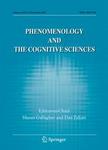版权所有:内蒙古大学图书馆 技术提供:维普资讯• 智图
内蒙古自治区呼和浩特市赛罕区大学西街235号 邮编: 010021

作者机构:Macquarie Univ Macquarie Ctr Cognit Sci Sydney NSW 2109 Australia
出 版 物:《PHENOMENOLOGY AND THE COGNITIVE SCIENCES》 (Phenomenology Cogn. Sci.)
年 卷 期:2010年第9卷第4期
页 面:521-560页
基 金:Australian Research Council ARC (DP0770271)
主 题:Extended cognition Distributed cognition Collaborative recall Memory Social memory Transactive memory
摘 要:This paper introduces a new, expanded range of relevant cognitive psychological research on collaborative recall and social memory to the philosophical debate on extended and distributed cognition. We start by examining the case for extended cognition based on the complementarity of inner and outer resources, by which neural, bodily, social, and environmental resources with disparate but complementary properties are integrated into hybrid cognitive systems, transforming or augmenting the nature of remembering or decision-making. Adams and Aizawa, noting this distinctive complementarity argument, say that they agree with it completely: but they describe it as a non-revolutionary approach which leaves the cognitive psychology of memory as the study of processes that take place, essentially without exception, within nervous systems. In response, we carve out, on distinct conceptual and empirical grounds, a rich middle ground between internalist forms of cognitivism and radical anti-cognitivism. Drawing both on extended cognition literature and on Sterelny s account of the scaffolded mind (this issue), we develop a multidimensional framework for understanding varying relations between agents and external resources, both technological and social. On this basis we argue that, independent of any more revolutionary metaphysical claims about the partial constitution of cognitive processes by external resources, a thesis of scaffolded or distributed cognition can substantially influence or transform explanatory practice in cognitive science. Critics also cite various empirical results as evidence against the idea that remembering can extend beyond skull and skin. We respond with a more principled, representative survey of the scientific psychology of memory, focussing in particular on robust recent empirical traditions for the study of collaborative recall and transactive social memory. We describe our own empirical research on socially distributed remembering, aimed